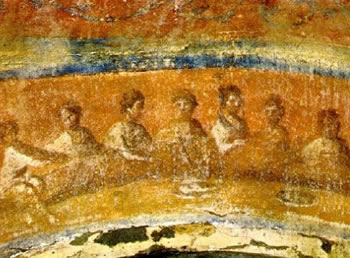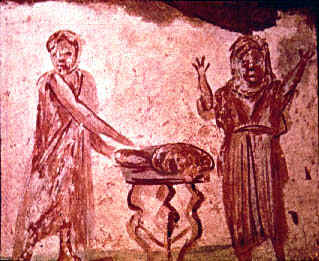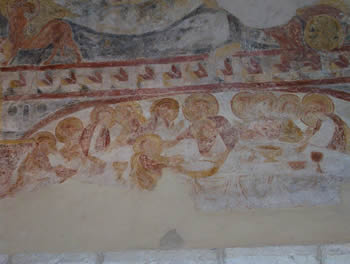Food, the Kingdom of God and
A Texas Street Wedding
For Sunday September 1, 2013
Lectionary Readings (Revised Common Lectionary, Year C)
Jeremiah 2:4–13 or Sirach 10:12–18 or Proverbs 25:6–7
Psalm 81:1, 10 –16 or Psalm 112
Hebrews 13:1–8, 15–16
Luke 14:1, 7–14
Earlier this summer I read two books about food, both of which I highly recommend — Salt, Sugar, Fat by Michael Moss, and Eating Animals by Jonathan Foer.
Both books are about more than nutrition. Moss reads like a cultural history of baby boomers with his discussions of Tang, Oreos, and Betty Crocker. Foer is a commentary on capitalism taken to its logical extreme — factory farms produce 99% of the meat we eat. Beyond our appetites are matters of conscience. Food ecology is important, but so is a food ethic. There's more to food than buying organic or going vegan.
Where you eat, what you eat, how much you eat, when you eat, and who you eat with all say something about your identity and community. In her review of Feast: A History of Grand Eating (2003), Ingrid Rowland notes how throughout history food has often been "the all-sufficient metaphor for power." That's a distinctly Biblical idea.
 |
The eucharist, "take and eat." |
Food plays a conspicuous role in the Bible. Jews celebrate liberation from Egypt with the Passover meal. Many of their 613 mizvot or commandments deal with dietary guidelines. Jesus's first miracle was to turn water into wine at a wedding party. The gospels speak of the Last Supper, the Lord's Supper, and the Great Supper — all material signs that signify spiritual realities.
There are stories about feeding the multitudes, eating with dirty utensils, farming, fasting, which foods are ritually clean or unclean and why, whether a believer could eat meat that had been sacrificed to pagan idols and then afterwards sold in the local market, and the poor begging crumbs from the rich. Luke's gospel for this week is only one of several stories that Jesus told in which food is a metaphor for power that builds or destroys human community.
Jesus often ate with fringe people, so much so that his detractors disparaged him as a glutton and a drunkard. For the religiously scrupulous person of his day, to eat with a "dirty" person defiled you and made you impure before both God and humanity.
But Jesus also ate with religiously zealous and socially powerful people. That's where we find him in this week's gospel. When Jesus was eating dinner with a prominent Pharisee, he noticed something about the guests and something about the hosts.
The guests at the party clamored for "places of honor" at the table. To insinuate ourselves into places of importance, to wheedle a prestigious invitation, to be seen at the right eatery with the right people, all these behaviors are what we're inclined to do. It's entirely human.
When I was in Oxford in the fall of 2002, I attended the beautiful service called Evensong almost every night. On my first night at Magdalen College (founded in 1448), I learned an important lesson: don't even think about sitting in the back row that's reserved for professors. Those are prestigious seats for important people, and never mind that the church was empty except for the boys choir and a few tourists like me.
 |
The eucharist, "take and eat." |
Whether it's sitting in the sky box at a football game or at court side at a basketball game, we confuse a powerful social location with an authentic personal identity. Just as school children long to demonstrate through their bag lunches that they are okay (do you remember school lunches?), adults try to demonstrate by their social location that they are important and powerful.
So Jesus warned the dinner guests — be careful where you sit; it might reveal more about yourself than you think.
Jesus then turned from the guests to the hosts. He commented on what we might call the law of reciprocity.
When you host a dinner party, you invite people whom you most enjoy, those whose presence in your house might flatter you. In fact, said Jesus, there's a decent chance these people will reciprocate and invite you to their party, which is exactly what you hope.
But with the hosts Jesus also turned the tables. Instead of those whom we would most likely invite — "your friends, your brothers or relatives, or your rich neighbors, " Jesus challenges us to host those whom we are least likely to invite — "the poor, the crippled, the lame, the blind."
Just as he warned the guests, Jesus warned the hosts: be careful about your invitation list. Like your seating preferences, it says something about your deepest identity.
Jesus warned both guests and hosts, "Everyone who exalts himself will be humbled, and he who humbles himself will be exalted." Commenting on this passage from Luke, William Willimon, former professor and dean of the chapel at Duke University for almost thirty years, observed, "there is a warning here about the advent of a kingdom where those who are full, and content, and on top get dislodged."
When my friend's daughter, Lisa, got married, they wanted to invite their entire church, but budgetary constraints prohibited that. Instead, after the service, they had the local police block off the main street in downtown Waco, Texas. Guests danced in the streets and enjoyed refreshments from a Baskin Robbins ice cream cart. The gazebo in the park next to the theatre sheltered the wedding cake.
 |
The eucharist, "take and eat." |
Lisa's husband, Chris, had made friends with a number of homeless men who lived under a bridge. As a pastor, Chris had employed them for odd jobs at his church. "Coyote," the leader of his homeless friends, attended the wedding in his standard attire of jeans with holes in the knees, a scraggly beard, and unwashed hair. He organized his friends to clean up the streets after the wedding, then sat on the curb with a big smile and smoked a cigar.
Another guest was Lisa's next door African-American neighbor. The little girl loved to spend time with Lisa, and really wanted to come to her wedding. So the mother, the daughter, and the grandfather all came. The 70 year-old grandfather was soon the center of attraction as he went out on the street and danced to the music. Soon the college girls were vying to dance with him.
As passersby strolled by and inquired about what was happening, they too were invited to the wedding. There were guests dressed in their nicest clothes alongside guests who wouldn't feel at home at a formal occasion. However they dressed, every person felt welcomed as an honored guest, just as God himself welcomes us to himself, and invites us to welcome each other.
For further reflection:* From the epistle for this week: "Do not forget to entertain strangers, for by doing so some people have entertained angels without knowing it" (Hebrews 13:2).
* How is the Lord's Supper a sign of the kingdom of God?
Image credits: (1) Layanglicana.org; (2) Ookaboo.com; and (3) Nick Thompson.





